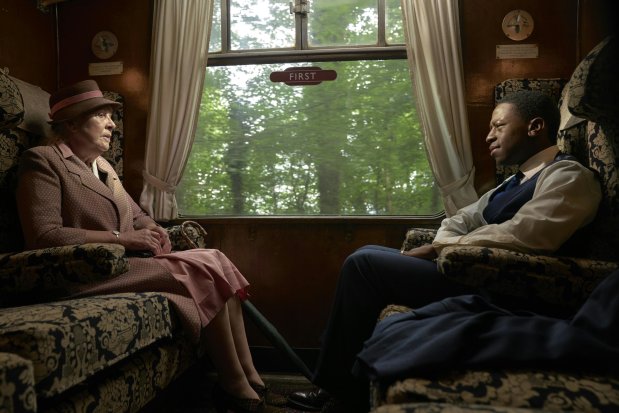Agatha Christie’s mysteries work not only because they’re great puzzles (some are even anticlimactic) but because she creates such rich and often faintly ridiculous characters, and then puts them into vivid scenarios that allow for sly social commentary about a certain kind of Britishness. Not enough of that is present in the two-part adaptation of her 1939 novel “Murder Is Easy” on BritBox, which makes key changes that end up stranding everyone — viewer included — in dull circumstances.
In the original, a British policeman named Luke Fitzwilliam has just returned home to England after a long stint overseas. On the train, he meets Miss Pinkerton, a chatty older woman who is on her way to Scotland Yard. People keep dying in her village, you see, and everyone assumes the deaths are unfortunate accidents or from natural causes. But Miss Pinkerton has other ideas. She thinks one person is responsible. Before she can report her concerns, she turns up dead too and Luke is compelled to dig into her suspicions.
Off he goes to the countryside to investigate, using some light scheming to worm his way into the home of Lord Whitfield, the village’s wealthiest man, by posing as a cousin of Whitfield’s fiance, a much younger woman named Bridget. Luke’s mild deception is essential because he’s an outsider in an insular place, but a (phony) family relation means his presence doesn’t set off too many alarm bells. He tells everyone he’s writing a book about local superstitions. This is his opening to ask probing questions about the recent spate of deaths, and it’s how he amasses a list of primary suspects.
The TV adaptation from Sian Ejiwunmi-Le Berre has shifted the year to 1954. Luke is now an upper-class Nigerian (David Jonsson) who has moved to London to work in a government posting. On the train, he encounters the wonderfully Marple-esque Miss Pinkerton (Penelope Wilton) and it’s a promising start: “I must report” — she pauses for dramatic effect — “murder.”
Her death shortly thereafter weighs on Luke, who is staying with fellow Nigerians he knows from back home, cooling his heels as he waits for confirmation about the new job. He will be working for “that colonial butcher,” one of his friends scoffs. “Behold, the imperial African, self-colonized, collaborating with his oppressors,” she says. Luke stares back evenly. “He offered me a job.” That’s the extent of any commentary on this topic or its potent tension. Luke is a model minority in contrast to his friends, who are openly skeptical of the status quo — but alas, they have no place in the story once he begins his amateur investigation.
Luke arrives in the village absent any helpful connections to explain away his presence, posing as a cultural anthropologist on a research trip. He’s greeted with suspicion, some of it quiet, some of it overt. This is one of the more compelling tweaks in Ejiwunmi-Le Berre’s adaptation. In nearly all of Christie’s books, her English-born characters are obsessed with referencing a person’s foreignness. It comes up again and again, they can’t help themselves and the subtext is always this person is not one of us. That Luke is not just an unfamiliar face but the only Black person for miles only deepens that sense of everyday xenophobia, and racism is the undercurrent of many of his initial encounters. When he’s invited to dine at Lord Whitfield’s manor, Bridget greets him cheerily: “We’ve never had a cultural anthropologist for supper, so we thought we’d have you for starters.” The double meaning is yikes! in all the right ways, as if Luke were literally on the menu.
And yet, the two-hour TV movie fails to develop any of its characters beyond broad strokes. A number of trims have been made. Timelines are altered and some characters changed, or eliminated altogether. That’s a given in adaptations. But this version of “Murder Is Easy” has collapsed too much. The careful equation devised by Christie doesn’t work anymore. Instead of several suspects for Luke to consider, the story narrows it down to one or two and the mystery loses its snap. His careful process of elimination becomes perfunctory and Jonsson is given little to do but react placidly to the cardboard characters around him.
If the writing lacks suspense, the visuals try to make up for it. A bird dive-bombs Luke as he makes his way to dinner at the manor house (where the reception rooms are small and give the production a budget-conscious look). A bug crawls ominously on a statue. Luke flashes back to a vague, unexplained memory of a wooden idol engulfed in flames. These are all moments of empty menace.
The ending suggests that Luke may not be that enamored with England after all. Too bad the transformation isn’t slowly built into the story, but abruptly tacked on. Then again, he just spent an inordinate amount of time contemplating the murderous tendencies of the people in his newly adopted home. Who wouldn’t have a change of heart?
“Murder Is Easy” — 1.5 stars (out of 4)
Where to watch: Britbox
Nina Metz is a Tribune critic.




